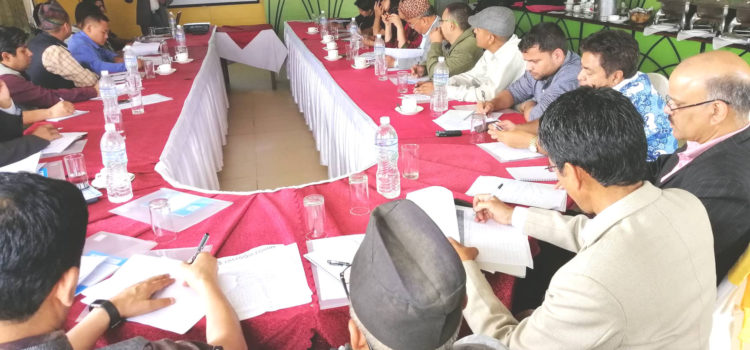Freedom Forum organized a policy stakeholder discussion on “Right to Information (RTI) Bill-State 3” on 24th April 2019 in Kathmandu. Various State Assembly Members of State-3, lawyers, policy stakeholders, RTI activist and campaigner, media fraternities and other concerned stakeholders participated the policy dialogue event on the proposed bill which is under consideration in State Affairs Committee of State Assembly.
Highlighting the objective and background of respective bill, Freedom Forum’s Project Manager Mr. Sanjeeb Ghimire presented a brief paper about the bill, their positive and negative aspects/ impacts and what needs to be done or amended further to make it well acquainted with the international and constitutional standards and best practices of rights relating to Freedom of Expression and Information.
Meanwhile, various speakers expressed their opinions regarding the questionability and validity of provision containing RTI Bill and amendment proposals held by the State Assembly Members. In the meantime, Former Secretary of National Information Commission (NIC), Shree Ram Panta stated the reason and purpose must not be compulsory while filing RTI request. He further stressed that provision of sentencing & punishment must be as a part of the proposed law.

Chief Executive of Freedom Forum Taranath Dahal argued that proactive disclosure is the crux of RTI law so it must be a compelling provision for all public bodies, not the voluntary one. Similarly, “this bill must be included a political party in the list of public bodies and the provision of punishment when not fulfilling the RTI compliance “he further added.
Showing strong concerns on the respective bill, Legal and Policy Advisor of FHI360, Tanka Aryal felt the record of information requests and supply must be kept updated in the public body’s repository system. And technology friendly medium and procedure of information request via postal, email, fax, scan, etc; should be contained in the law.
Adding to the concerns of Aryal, the proposed bill only provisioned the assurance of information request not guaranteeing of receiving the requested information said Ramesh Paudyal, Member of State Assembly.
Another State Assembly Member of State 3, Rajendraman Shrestha said that if we ratified proposed RTI Bill as it is, it can be disastrous for democratic milieu so we asked the government for withdrawal of this bill. There’s need of more progressive law not regressive one, said Shrestha
Similarly, Radha Ghale, another State Assemblymember emphasized RTI law must assure the pro-democratic and transparent governance, not bad governance. Sita Lama, another State Assemblymember asserted about the need for categorical points what to amend in the content of the bill in order to work accordingly and make the proposed bill more progressive.
Focusing on the clarity in the respective bill, another State Assemblymember Bijaya KC Shrestha stated the bill must be clear about the private vs. public information regarding public officials. All the matters public officials must be the matters of public concern except few personal and private matter.
Accepting the flaws in the respective bill, Jeevan Dangol, State Assembly Member said the bill needs massive discourse further to make it more progressive states.
The proposed RTI Bill must be withdrawn by state-3 government, because if it is passed as it is, it will then create hurdles the very fundamental rights of Nepali individual, added Tsering D. Lama, State Assembly member.
Concluding the program, Chairperson Hari Binod Adhikari showed his concern towards the weakness in RTI Bill and regards to the participants where various State Assembly members of State-3, Former Secretary of NIC, Advocates aired their views on revising the bill related to Right to Information.
The program held as part of the program “Civil Society Mutual Accountability Project (CS: MAP)”, supported by FHI360; was attended by 37 participants. Out of 37 participants, there were 10 female participants in the program.

